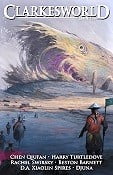 Clarkesworld #155, August 2019
Clarkesworld #155, August 2019
“Entangled” by Beston Barnett
Reviewed by Victoria Silverwolf
The latest issue of this award-winning publication offers four original short stories and two newly translated novelettes.
“Entangled” by Beston Barnett features a unique form of contact with extraterrestrial life. At the moment it is born, an alien is placed in a device which allows instantaneous transmission of its consciousness into an artificial body on Earth. Although its real body remains on its native planet, its mind exists on our own world. It is raised from infancy by a human couple, and thinks of them as its parents. Much of the story deals with the genderless alien’s desire to have a romantic but sexless relationship with a human being.
The author skillfully conveys the main character’s ambiguous nature, part human and part alien. The story is divided into sections labelled either “air” or “ground,” based on the double-layered alien language. (The alien, raised on Earth, has to learn the native tongue of its home world as a foreign language.) The “air” sections are plot, the “ground” sections background. This structure allows the author to explain the story’s premise clearly, but interrupts the narrative with dry exposition.
In “Onyx Woods and the Grains of Deception” by D.A. Xiaolin Spires, outsiders with their own agenda convince a king to cut down the forests in his realm and replace them with fields of grain that they supply. The trees have hard exteriors and crystal cores. Normally, the core shatters at the last blow of an ax. The narrator obtains a rare, unbroken crystal, which proves to be the key to freeing the land from the outsiders.
The author creates a strange, exotic setting with a great deal of imagination. The description of the weird trees, given in great detail, is particularly effective. The way in which the crystal inspires the narrator is hard to credit.
“Your Face” by Rachel Swirsky is a very brief story, told entirely through dialogue, about a mother confronting the downloaded consciousness of her dead daughter. Their conversation reveals the tragic event that ended the daughter’s life, and the fact that the computerized version of her mind remembers nothing prior to about a month before the accident. The characters are fully developed in a few words, and the story has a powerful emotional impact, but the premise is a familiar one to readers of science fiction.
Harry Turtledove, a prolific, award-winning author best known for alternate history, pictures a slightly different version of England just prior to World War Two in “The Yorkshire Mammoth.” In this reality, glaciers still exist in the northernmost parts of Britain. Because of the colder climate, saber-toothed tigers and other Ice Age animals only went extinct in historic times. Mammoths, however, survive, and are even domesticated for use as farm animals. The narrator is a veterinarian who has to figure out a way to deal with a mammoth with a broken tusk.
Completely convincing in all its details, this is a charming story, light in tone without ever becoming comedic. It seems intended as a tribute to James Herriot, author of All Creatures Great and Small, which also deals with a veterinarian in Yorkshire. If so, it is more than worthy of its model.
“In This Moment, We Are Happy” by Chen Qiufan (translated from Chinese by Rebecca Kuang) takes the form of a script for a documentary. The various sections of the fictional film deal with surrogate pregnancies in different ways, from the present to the future. We see a wealthy Chinese woman and the poor Indian woman who will bear the child she adopts; we witness a male performance artist with an artificial womb; we visit two women whose genetic material blends to create their child; and we journey to a secret location where artificial intelligences breed human beings.
The story considers many aspects of parenthood in a way that raises important questions. Although it often deals with highly emotional issues, the narrative structure tends to distance the reader. Some sections are very believable, while others are less plausible.
“The Second Nanny” by Djuna (translated from Korean by Sophie Bowman) is a space opera with a complex, often confusing background. Before the tale begins, artificial intelligences wage war on Earth, greatly reducing the human population. Less aggressive AIs control the other planets in the Solar System. A spaceship brings the seeds of human life to the AI in charge of Saturn, leading to a colony of artificially grown, computer-linked children on Titan. The story starts when a woman arrives on Titan with unknown motives. Meanwhile, the last surviving AI from Earth, now drifting through space in the form of countless tiny machines, approaches Titan, intent on destruction. It all leads up to a fast-paced and dramatic final battle.
Most of the back story described above does not appear until late in the narration, making the plot hard to follow. Some things are never fully explained, such as the bridge that the Neptune AI is building in empty space for unknown reasons. The story is full of speculative concepts, perhaps too many.
Victoria Silverwolf is surprised that this issue didn’t have a reprint.